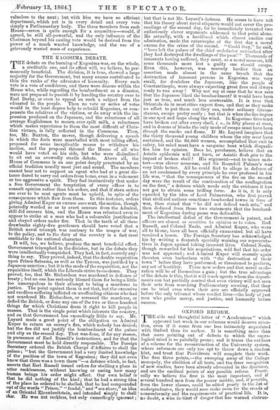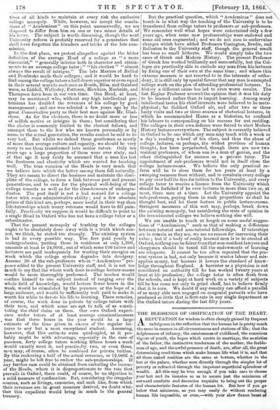OXFORD REFORM.
THE able and thoughtful letter of " Academicus " which appeared last week in our columns would deserve atten- tion, even if it came from one less intimately acquainted with Oxford than its author. It is something more than that mere pointing out of defects to which the supra- logical mind is so painfully prone; and it traces the outlines of a scheme for the reconstruction of the University system, where reformers are only too apt to throw down a random hint, and trust that Providence will complete their work. The first three points,—the sweeping away of the College monopoly, the abolition of all tests, and the freer recognition of new studies, have been already advocated in the Spectator., and are the cardinal points of any possible reform. Pract!- cally we believe the first is the most important, and if several hundred men from the poorer middle, and, if possible, from the lower classes, could be added yearly to the het of undergraduates, they would soon make room for the creeds of nonconformity and the requirements of practical life. It is, no doubt, a wise in,tinot of danger that has warned obstruo- fives of all kinds to maintain at every risk the exclusive But the practical question, which "Academicus " does not college monopoly. While, however, we accept the conclu- touch is in what way the teaching of the University is to be alone of " Academics:Ls " on this point unreservedly, we are transferred from college tutors to professors or sub-professors. disposed to differ from him on one or two minor details of We remember well what hopes were entertained-only a few his letter. The subject is worth discussing, though the next years ago, when some new professorships were endowed and -University reform is probably reserved for a generation that some old ones augmented ; and we do not care to undervalue shall have forgotten the blunders and tricks of the late corn- changes which have added Professors Conington, Brodie, and mission. Rolleston to the University staff, though the general result That the present monopoly of teaching by the colleges tions of "Academicus," such as that of making a difference ought to be absolutely done away with is a truth which can- between tutorial and non-tutorial fellowships. If tutorships not, we think, be stated too strongly. The existing system are to remain as they are, we see no reason for increasing their is bad in every possible way. The fees paid yearly by value ; but if a body of really learned men is to be created at undergraduates, putting those in residence at only 1,200, Oxford, nothing can be fairer than that non-resident lawyers and amounts at least to 24,0001., out of which some 100 tutors and clergymen should be taxed till the endowments of learning lecturers are paid inadequately for wasting their energies on are adequate. It cannot be too often repeated that the pre- work which the college system degrades into drudgery. sent system is bad, not only because it wastes labour and mis- Assume 20 of the sub-professors whom " Acadernicus " pro- applies money, but because it lowers the standard of know- poses added to the present University staff, and it is not too ledge throughout England. A barrister or a physician is not uch to say that the whole work done in college lecture-rooms considered an authority till he has worked twenty years at would be more thoroughly performed. The teacher would least at his profession ; the college tutor is often fresh from confine himself to one subject instead of ranging over the the schools, and is kept at hard work on a variety of subjects whole field of knowledge, would lecture fewer hours in the till ho has come not only to grind chaff, but to believe firmly week, would be stimulated by the presence or the hope of a that it is corn. We doubt if any country can afford a parallel large audience, and would bo sufficiently well paid to make it of so many able men engaged on congenial pursuits who have worth his while to devote his life to learning. There remains, produced so little that is first-rate in any single department as of course, the work done in private by college tutors with the Oxford tutors during the last fifty years.
their men, and which some are apt to talk of as consti- tuting the chief claim on them. Our own Oxford experi- any further sum could be obtained from curtailing the income of the Heads, where it is disproportionate to the rate that prevails in Oxford, there could, of course, be no objection to a mild measure of confiscation. But, considering the irregular sources, such as livings, canonries, and such like, from which their revenues are in great measure derived, we doubt whe- fives of all kinds to maintain at every risk the exclusive But the practical question, which "Academicus " does not college monopoly. While, however, we accept the conclu- touch is in what way the teaching of the University is to be alone of " Academics:Ls " on this point unreservedly, we are transferred from college tutors to professors or sub-professors. disposed to differ from him on one or two minor details of We remember well what hopes were entertained-only a few his letter. The subject is worth discussing, though the next years ago, when some new professorships were endowed and -University reform is probably reserved for a generation that some old ones augmented ; and we do not care to undervalue shall have forgotten the blunders and tricks of the late corn- changes which have added Professors Conington, Brodie, and mission. Rolleston to the University staff, though the general result schoolmaster. We are unable to touch at length on some useful sugges-































 Previous page
Previous page